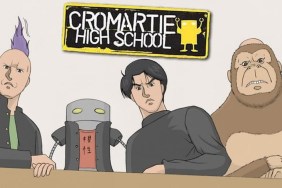
It Follows is terribly eerie. Its also clever and stunningly composed, viciously getting at inevitabilitythe doldrums of the suburbs, our eventual end, the onset of such anxiety as we enter adulthood. And of course, reprieve from it all. Its initially hard to move past its conceit though, this sexually transmitted haunting that overwhelms both your fear and your mind. The sex of It Follows, both its freeing nature and monstrous consequence, is only a window to director David Robert Mitchells worldview. It took my second viewing to fully grasp this. Unfortunately, I spoke with the filmmaker before then.
Thankfully, Mitchell is well spoken and sharp, cutting to the core of his movie and his intent. Hes looking to explore all film and here, he tries on horror. I thought it would be cool to do my version of it, he says, try to figure out what that even was. Turns out, its one of the best American horror films weve got.
Shock Till You Drop: In slashers and urban legends, the subtext is often the dangers of sex. This is more overt here, so it seems as a counter balance youve made the scares less pronounced. Subtler, eerier.
David Robert Mitchell: The movies about dread. Theres a few surprise scares, theyre fun. To me, theres a difference between being startled and being scared. Dread and being unnerved and having anxiety to me can be just as powerful, and also have the ability to sit with you in a way that being startled does not. Im less interested in jump scares. The idea of the film is about waiting, knowing that somethingfor the characters, for the audienceis out there thats coming closer. At some point, its going to reach you, and having to live with that and having to have moments where it isnt here. Its about those sort of calm spaces in between those moments of terror that, on some level, can be more disturbing.
Shock: The kids here feel authentic, like in The Myth of the American Sleepover. Are you more conscious of kids and how they interact?
Mitchell: I think its more just about how a filmmaker chooses to deal with human beings, not just young people. Across the board, there are films that treat their characters as people, and thats what it really comes down to. Its about trying to imagine what it might feel like to have your normal world turned into a nightmare and how someone might react. This isnt about trying to create some representation of complete naturalism. The movie is not meant to be, how does a person react when fighting monsters simulator. If Im going to make a film and build a story around these characters, then Im going to give a shit about the characters. I care about them, I want the audience to care about them. I want people to try and connect on some level. Also, if you dont do that, people arent going to be involved. Its inherently less scary, if you dont care. Then all you have is attacks and violence and situations that can raise your blood pressure, but arent necessarily getting to you on a deeper level.

Shock: I think as a kid, when youre into horror or niche things, it helps give one an observational quality. Were you a fan growing up?
Mitchell: Ive been a horror fan since I was a kid, for sure. Everything I can see, Ive seen. Totally, I made this movie because I like these kinds of movies and thought it would be really fun to make one.
Shock: When did you think that? After Myth?
Mitchell: Well, always. I wrote this after Myth, but I wrote a bunch of other stuff. Its just one of many kinds of movies I want to make. I thought it would be cool to do my version of it, try to figure out what that even was. I always knew I would try to make a horror film. I actually intended this to be my third film. There was another drama, it was just taking too long to pull it together.
Shock: Was there a pattern to how you visualize It in the film?
Mitchell: When I wrote it, it was whatever felt right to me on a scene-by-scene basis. Sometimes its about being normal to get closer, sometimes its about trying to take on an appearance to shock or to hurt the character. I couldnt think of why I placed them in certain moments, just what felt right to me.
Shock: It Follows reminds me of the end of Shivers. This idea of fucking the stigma away.
Mitchell: I dont see the film as puritanical. I dont love that, to be honest. I know some people see it that way, and I understand why. It would be easy to see it that way from a certain perspective. To me, sex is a very normal part of life and yes, the character does open themselves up to some danger through sex, but its also how they gain some freedom and some safety as well. What is life but dealing with our mortality and on some level, trying to find a way to be at peace through our life? Thats through love and sex and connection. You cant truly escape that, but you can push it away for now, in the moment.
It Follows is out Friday, March 13th. Its a must-see. For more, see Shock’s review here.









